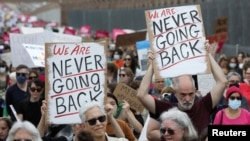Experts say an overturning of Roe v Wade would have an inevitable major knock-on effect in Africa, emboldening anti-abortionists and boosting their funding, much of which comes from American pockets.
According to the World Health Organization (WHO), 75% of African pregnancy terminations are unsafe. The WHO says they occur in homes or backstreet clinics, sometimes by inserting knitting needles or bicycle spokes, or drinking bleach.
When a desperate and bleeding 17-year-old girl walked into his rural health centre, Kenyan medic Ismail Mohammed Salim thought he was doing the right thing by helping her conclude an unwanted and dangerous pregnancy.
Days later, both were in jail.
"I gave an evacuation service to save a patient's life as the government trained me to do. Then I'm prosecuted," said Salim, who was accused of performing an illegal abortion and detained in Kilifi town, where he had to sleep 20-to-a-cell.
The global health body adds that there are around 73 million abortions globally per year, 45% in unsafe conditions. Poor nations bear the brunt, with 220 women dying for every 100,000 unsafe abortions.
"It is a major threat to abortion rights globally," said Evelyne Opondo, senior regional director for Africa of the Center for Reproductive Rights, covering Kenya, Uganda, Malawi, Nigeria, Tanzania, Rwanda and Zambia.
U.S. President Joe Biden eliminated his predecessor Donald Trump's so-called "global gag" rule banning funds for aid groups that discuss abortion, and has promised counter-measures should Roe V Wade be overturned.
But a skeptical Opondo observed: "A lot of us have looked up to the U.S. for a lot of things really, and perhaps believed too much in their system."
